QWER Hacks 2022 Workshop : Accidental Activism in Academia
QWER Hacks @ UCLA is Major League Hacking's (MLH) first LGBTQIA+ hackathon. This years theme was Embracing Identity Through Self Empowerment and had four tracks: Community & Connection, Health & Wellness, Learning & Growth, and Art & Expression.
While the event lasted from January 21st through the 23rd, I hosted my workshop on Saturday, the 22nd. This was the first workshop I've ever hosted outside of Drexel and it was pretty exciting to put together. My workshop was titled Accidental Activism in Academia and was focused around my journey in starting my activism work and how to do it intentionally.
I'm gonna spend this post going over my experience at the hackathon, creating my first workshop outside of Drexel, and going more in depth than my slides allow. The experience of planning the workshop, then hosting it, then creating this write up has been so incredible and rewarding. I'm so thankful to the QWER Hacks team for having me.
Slides Breakdown
This is my first time hosting a workshop outside of Drexel, so I'm super excited. I only have 30 minutes to host this workshop, so I needed to take the time to focus, what do I want to cover, and how do I want to cover that?
I knew I wanted to cover my journey through activism and how to replicate that, but I soon realized it was easier said than done. The first challenge was figuring out what exactly I did. I didn't plan anything I've done at Drexel. It just happened and snowballed and turned into the position I have today. So first, I needed to figure out what I did, and how to replicate it. The second challenge, once I figured out what exactly I wanted to present and what other people could benefit from, was fitting it in the 30 minute time limit. I had to cut a lot of content I wanted. Despite the cuts, I'm still happy with the content I created.
I wanted to take the time to go over my slides and add material I didn't have time to cover. I omitted a few slides from my explanation, but those slides primarily covered logistics from the day of.
- My Background
- Overview of Categories
- Actively Violent
- Passively Discriminatory
- Reactive Actions
- Preventative Actions
- Strengthening Actions
- How to Move Forward
- The Reality of the Situation
- How to Survive This Journey

Slide 3: My Background
I am currently in my senior year at Drexel University. Looking back, I could have never predicted the path I would take here during my undergraduate education. I have had such an influence on this college that I would never have asked for. Now, I'm in a position where graduation is imminent and I need to finish the work I can, or pass it onto someone else. This requires looking back and figuring out what exactly I did. I took the time on this slide to identify some of the most impactful events of my career as an activist at Drexel.
Closeted through High School
High school Charlie would be quite disappointed in undergrad Charlie. High school Charlie was an angsty teenager who wanted nothing to do with school and would be truly disgusted to know how much undergraduate Charlie has done both socially and academically. I really was an entirely different person. I was closeted and afraid and wasn't fully aware of the gravity of what I was facing. It wasn't until I started to come out in college that I realized what life could be.
Starting College and "Coming Out"
I put "come out" in quotes here. I realized in my first week at Drexel that no one knew who I was and I took this time as an opportunity to reinvent myself. I didn't tell anyone what my legal name was. I introduced myself as Charlie. After my fall term, I decided to start using he/him pronouns and start correcting people on my gender. This was the first time I really embraced my gender out loud. However, I was still heavily closeted to both of my biological parents out of fear, and rightly so and they both ended up being quite horrible, only earning the title "parent" in the most biological sense.
Facing Transphobia From The Start
I introduced myself exclusively as Charlie to others. I acted as if I had no other name. However, my former legal name was used on class lists. This normally wasn't an issue. I'd contact professors via email or after class to let them know of the name change, and no one ever had any issues. Or, I'd just use only my student ID for attendance and assignment purposes. In my first term, I took a class called CI-101. It was a very basic class that just gave an overview of topics that fell under the broad umbrella of "computing". For this reason, many people skipped class and would have their friends sign them in for attendance credit. We soon lost the privilege of signed ourselves in and the TAs were forced to call attendance out loud everyday.
The first day that attendance was done out loud, our TA said "We have the wrong list. There isn't an former legal name in this class". My former legal last name was at the start of the alphabet and I knew the TA was referring to me, but didn't realize it. I raised my hand and corrected the TA, stating that despite having the legal name called out, my name is Charlie. The TA took this opportunity to exclusively call me by my legal name. He found it funny and would laugh at the fact I was uncomfortable by this.
At first, I didn't do anything and I wasn't going to do anything. I only reported the situation because my friends said I should. I told the professor and he moved me to a separate lab with a different TA. The department also had a sensitivity training for all the teaching assistants the next term, which coincidentally included me. The training was focused around people of color and women in STEM. I realized that the LGBTQ+ community was such a minority in STEM that we weren't even being included as a marginalized group.
oSTEM @ Drexel
I was inspired by the Women in Computing (WiCS) initiatives and their success and I wanted to replicate that for the LGBTQ+ community. I realized that I could count all the LGBTQ+ people I knew in the college on one hand and it was super isolating. So I went and researched to see if there were any initiatives that existed to build a stronger LGBTQ+ community in STEM. I came across Out in STEM (oSTEM) and started a chapter at Drexel
Donuts With The Dean
After oSTEM, the work I was doing just snowballed. I kept finding new issues to address, would assist in addressing them, which then unearthed even more places to improve. One of my more larger actions actually had nothing to do with oSTEM.
As I mentioned prior, I came out very slowly in college. In addition to using she/her pronouns for my first few weeks at school, I only used the women's restroom in public. I was genuinely terrified to use the men's room. It wasn't until my friend convinced me to start using the men's room with him. He would go with me in the men's room and act as a layer of safety and protection. Later that year, my friend graduated and CCI moved to our new building. In the move, we got a gender neutral restroom and I no longer had to fear using the men's room alone. This quickly changed when our gender neutral restroom has constant plumbing issues and was consistently closed. In the men's restroom, I was always stared at by everyone. People would just stare at me with their jaw open and this look of confusion or disgust on their faces. It was the type of behavior I expected from students, however, I was also treated the same by faculty, staff, and the Dean. I was fed up with the inaccessibility of the only safe restroom in the building and the way that even the Dean was treating me. I decided that in order to get through, I needed to bring up my concerns in a way the Dean would understand. The Dean hosts an event "Donuts with the Dean". Here, they serve free donuts and coffee and the Dean hosts a panel alongside the department heads to answer student questions. At this panel, I publicly voiced my concerns about the broken restroom and ended by stating that I felt unsafe in the gendered restrooms based on the Dean's treatment of me. The Dean got the message, sent out a college wide email about the incident, and within a week, the bathroom was fixed.
DEI Council and Admin Work
After the Donuts with the Dean situation, I started working with admin to not just address the concerns I had, but to address any concerns within the college and start creating systemic change. I started my pronouns initiatives and an initiative to get menstrual waste bins in the men's restrooms (this one is still in progress). I later joined the CCI Diversity Equity and Inclusion Council and continued my work in admin.

Slide 4: A Overview of the Five Categories of Actions I've Defined
In an effort to figure out how I went about this journey through activism, I created these five "categories" of actions and environments. I figured that in order to figure out how to deal with something, you first have to know what you're dealing with. Also, in order to have progressive conversations, we need the vocabulary to describe the situation and why it's a problem.
I tried my best to order these in terms of "severity" to show that you don't fix discrimination with one massive swoop, but by progressing through step by step. However, this image is probably more accurately drawn as a massive venn diagram with millions of overlapping categories. These categories aren't meant to be set in stone, they're just meant to provide descriptors to behaviors you'll experience. An environment can exist with aspects of all 5 categories. I've named the categories as follows, and the next five slides cover them more in depth:
- Actively Violent
- Passively Discriminatory
- Reactive Actions
- Preventative Actions
- Strengthening Actions

Slide 5: An "Actively Violent" Environment
An Actively Violent environment is one where it is dangerous to be out. This is a place where hate crimes are rampant, encouraged, or defended. Discrimination is explicit and blatant. It is clear that marginalized groups are not welcome here because they are a marginalized group. These include things like Jewish centers being vandalized with Nazi imagery or Confederate flags, slavery, or Jim Crow imagery used to taunt Black students or faculty. There is a strong effort to drive out marginalized groups.
This is a situation where you're not going to get very far with the university administration. In this case, there needs to be outside intervention or a large organized action. As one person though, the most important thing to do is to protect each other. It's okay to remain closeted if it keeps you safe. You can build a community while closeted. In an actively violent environment, it is a powerful and radical act to form a small loving community.

Slide 6: A "Passively Discriminatory" Environment
A Passively Discriminatory environment is a step above "Actively Violent", but still not great. There still may be violent hate crimes and prevalent discrimination. The difference is the action taken by administration.
Administration with acknowledge actions. I want to highlight the use of the word acknowledge, because I don't want to give more credit than is due. When I say acknowledge, I mean the administration may make a statement, but the buck stops there. Statements are to protect the college and to feign action. These statements will typically be made only after an issue was made public and the administration was under fire. These statements will typically not take a side either and will condemn both or acknowledge good people on both sides. I will say that issues aren't black and white and more complex than "good vs evil", however, in the case of blatant discrimination where there is a clear attacker and victim, there needs to be reparations.
In this environment, reparations aren't important. The optics is what matters here. Any actions taken are only to improve the image of administration, not to help a hurting community.
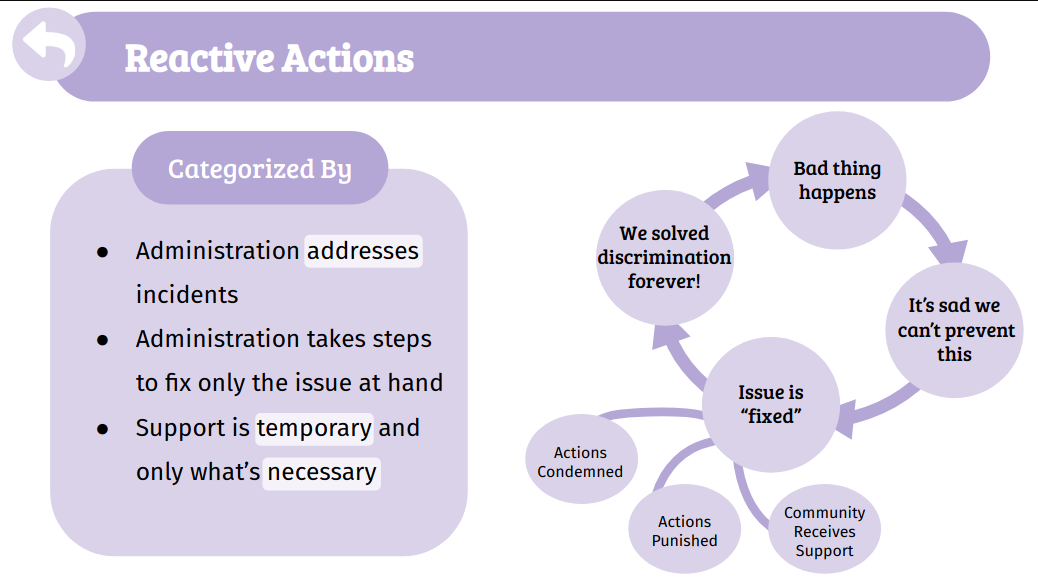
Slide 7: "Reactive Actions"
Going a step further than acknowledging issues, administration can address issues with Reactive Actions (I probably could've chosen a less redundant name). These actions aren't horrible. Typically, these are done by people who do care and do want to improve the situation and make reparations. The issue is that these actions are only in reaction to issues that happen.
Here, we'll see this cycle. There will be a "bad thing" that happens. This can be hate crimes or discrimination or anything not great. A statement will be sent out about how the community is in pain and how are taking action to fix this. Then, unlike before, actions will actually be taken. The community will receive the support it needs to heal and move past this incident. Attackers will be punished and condemned. Then, the action stops. There are no further steps taken to prevent things from happening again or to address other issues the community is facing. Now, when a "bad thing" inevitably happens again, we have to start all over, and this cycle continues. This cycle quickly becomes exhausting.
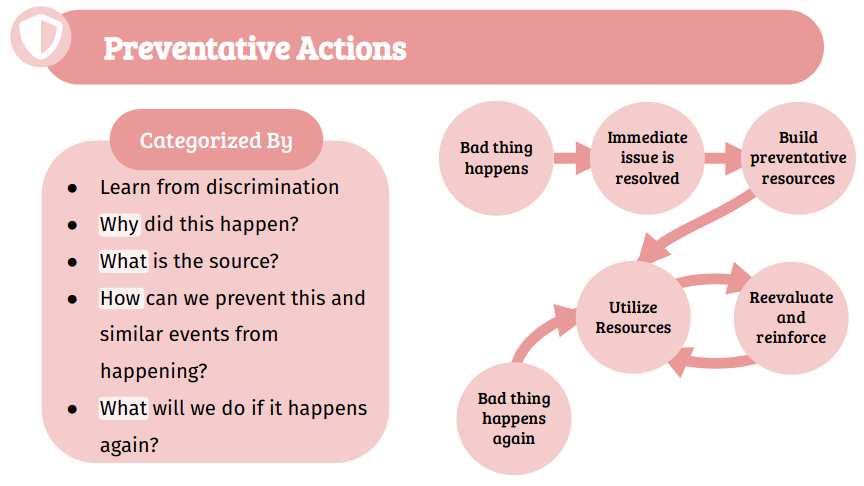
Slide 8: "Preventative Actions"
We can expand on just reacting by taking Preventative Actions. Once again, we are still reacting to incidents as they happen, but now, we're trying to learn from the discrimination that was experienced. We start to ask the following questions
- Why did this happen?
- What is the source of the issue?
- How can we prevent this from happening again?
- What will we do if this happens again?
- Can we apply this response to similar events?
Now our cycle looks different. Inevitably, discrimination will occur no matter how safe an environment is. Once again, we will react to the discrimination and take actions to address the immediate issue. Now, we won't stop when the issue is "fixed". Instead, we'll ask the above questions and build resources to prevent this from happening again. These can be educational resources or formal processes or community supports. These are resources the community can use even when there isn't an outstanding issue to be dealt with. As we utilize the resources we built, we reevaluate them. Are they working? Do we need to reevaluate our approach? When a "bad thing" happens, now we're prepared to address it and we can make reparations faster.
Notice we still have this small cycle of using resources and reevaluating them. This cycle is much less exhausting than a simply reactive cycle because we don't have to start over so many times. There is no way to avoid a "cycle" when doing activism work. As people and communities, we are always growing. The goal should be not to remove a cycle, but create a cycle focused on growth.
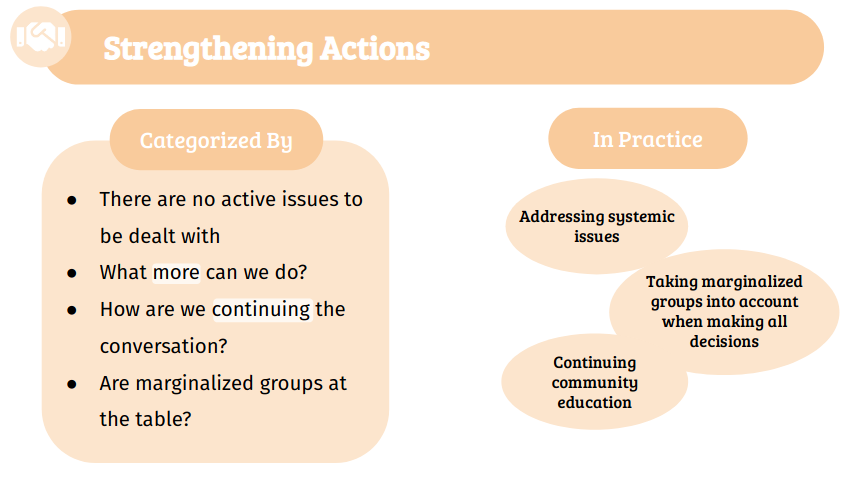
Slide 9: "Strengthening Actions"
Strengthening Actions are very similar to preventative actions. The difference I want to make is that we're no longer reacting to incidents anymore. Not only are we learning from discrimination, but we're learning from marginalized groups and tackling larger systemic issues.
The largest part I want to point out here is that marginalized groups are at all tables and have a say in all decision making processes. We are not just using marginalized community members in "discrimination solving" situations. We are also taking their opinions into account when we don't even think we have to. Let's say a new building is being built on campus. Cisgender people may not recognize the need to include a gender neutral restroom. Able bodied people may not recognize an inaccessible environment. While the onus shouldn't always be on marginalized groups to bring these issues to attention, it's hard to recognize issues unless you've already been exposed to them.
Strengthening actions are different than preventative actions because we're doing things we don't think we need to do. We aren't just addressing issues as they occur, but we are building a safer and more inclusive environment, not because we need to, but because we want to.
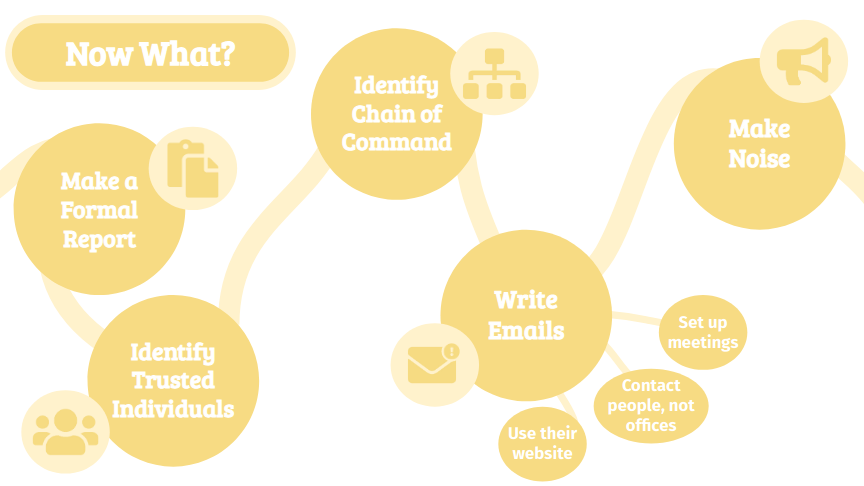
Slide 10: Asking "What Now?" and How to Move Forward
Now that we have the vocabulary to describe the situations we're faced with, how do we actually move forward and create change and progress?
Make a Formal Report
When faced with discrimination or specific issues, it's best to make a formal report for two reasons.
First, write down your story for your purposes. Most times, this is painful. It's hard to recount events right after they happen, but this can be a very important tool for trusting yourself. Recount events in as much detail with as much proof as you have. Put this in a safe place. Given a situation where people try to discredit you or gaslight you, refer to this and trust yourself. This helps you protect yourself from issues being belittled or ignored.
Second, making a formal report with whatever office handles these situations shows you are doing the right thing and you are doing what administration wants. It's much harder to discredit you if you file reports through their offices. Get receipts of these reports with dates and times. This adds a layer of accountability to administration. If they intentionally trash your case, you have further proof they're doing bad things.
The most important thing is to create a paper trail. If you have a phone call with any office, take notes. Include dates, times, who you spoke to, and their contact information. After the call, write an email thanking them for their time and recapping the material covered. Actions like these add layers of accountability to administration and add layers of protection to you.
Identify Trusted Individuals
This step is less of a step, and more of an all encompassing bubble. Identify people you trust and will work with you. This can be people in administration, faculty, staff, students, friends, or family. You will always be able to find at least one person to trust and support you, even if that one person is yourself.
If you find trusted allies in administration, faculty, or staff, use their resources. You are allowed to ask for support.
Identify a Chain of Command
This is another "not exactly step one, two, three", but more an important thing to do. You want to identify a "chain of command". In my freshman year, I had an issue with a TA, so I went to the professor they work for. When I've had issues with professors, I went to the department heads. If you had issues with the department heads, contact the associate deans. Work your way up the chain of command.
Almost all university employees have their roles and contact information posted publicly on the university websites. Use these public directories and resources.
Write Emails, Have Meetings
Once you know who to contact and how to contact them, it's time to write emails. Here, I have a few general tips.
Contact People, Not Offices : Offices do not care about you. People care about you. Find the contact information for the people in these offices and talk to them directly. Offices have to enforce policies and power structures. People are where change happens. Find the people and connect with the people.
Use Their Website : As before, almost all university contact information is posted on websites. Use these contacts. Additionally, take the time to read through any public university websites. Find their mission statements. Find their values. When you're dealing with offices or uncaring people, throw these back at them. These are their words that they were confident in and decided to make them public. They need to uphold them.
Set Up Meetings : Start at email to make the connection, but the email should be a lead in to setting up a face to face meeting. This can be online over Zoom, or in person in an office. Either way, people will care more when they're looking into the eyes of another person, not just reading words in an email. Use this at time to truly connect.
Be Nice : This one is tough. Sometimes you have to be nice to people you don't want to be nice to. Sometimes you have to be nice to people who aren't nice to you. Sometimes you have to be nice to people who don't deserve nice things. At the very least, you need to start nice. You need to be a person that people want to care about. It's hard sometimes to find a balance between getting justice and being considerate. You need to start nice though and make a good impression to avoid being discredited. If they do try to discredit you and your character, fight back.
I also wrote up an Email Template that I tend to use when I'm contacting someone for the first time.
Make Noise
This is the last option. This is where everything we've done has resulted in nothing. At this point, we're no longer dealing with people, we're dealing with structures, offices, figure heads, and politics. It's time to speak to the power structure in the language they understand and hit them in a way they care. This is where you hit them in the optics and the image. Bring your concerns to donors and alumni. These are the lifelines of colleges. Make noise. Go public. Force a response and force reparations. While this sounds aggressive, it doesn't mean violence. Non-violent actions can include:
- Petitions
- Protests
- Public statements
- Contacting outside authorities
- Organizing large groups of students
- Attending donor and alumni events
It's important to be strategic and organized. You can't just be loud and angry without going through the proper steps first. It may sound formal and annoying and a waste of time, but at this point, the structures you are protesting are going to do whatever they can to take away your credibility.
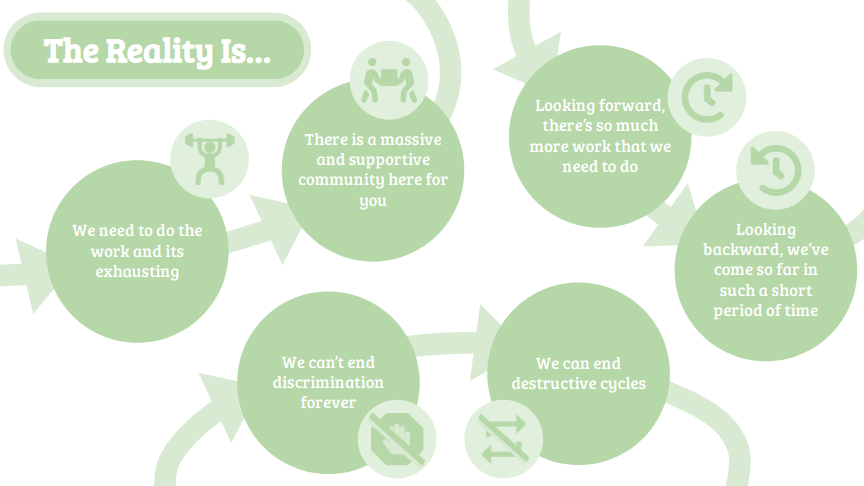
Slide 11: The Reality of the Situation
I did want to address the sad truths, but also happy realities of what this work is like. It's important to be realistic and understand what you're dealing with while also being optimistic and hopeful. All of this is easier said than done obviously.
| Marginalized groups need to do the majority of the work and it's exhausting | BUT | There is a massive supportive community that understands and is here to help |
|---|
It's really tough to acknowledge the amount of work that marginalized groups have to put in so we can have basic human rights. It's exhausting to always be the "loud trans person" bringing up issues that no one was talking about. However, there is a large community of other exhausted people and it's so much easier and less exhausting to do the work together.
| We can't end discrimination forever | BUT | We can end destructive cycles and replace them with healthier cycles built on growth |
|---|
I've mentioned this many times already, but discrimination will always exist. People will always exist who just hate me because I'm trans and they will intentionally misgender me no matter what. Hate just exists sometimes. While I don't have the power to stop individual people from hating me, I do have the power to stop destructive cycles and educate the people around me.
| Looking forward, there's endless work we need to do | BUT | Looking backward, we've come so far in such a short period of time |
|---|
This applies both to my specific journey through Drexel, but also to the LGBTQ+ community as a whole. It's hard to believe that same sex marriage was illegal in the United States until 2015, only 7 years ago. The Stonewall Riots, which are widely considered the beginning of the LGBTQ+ rights movement in the United States, happened in 1969. Even though we have so far to go and trans rights are constantly under attack, it's truly incredible how far we've come over the past 42 years.
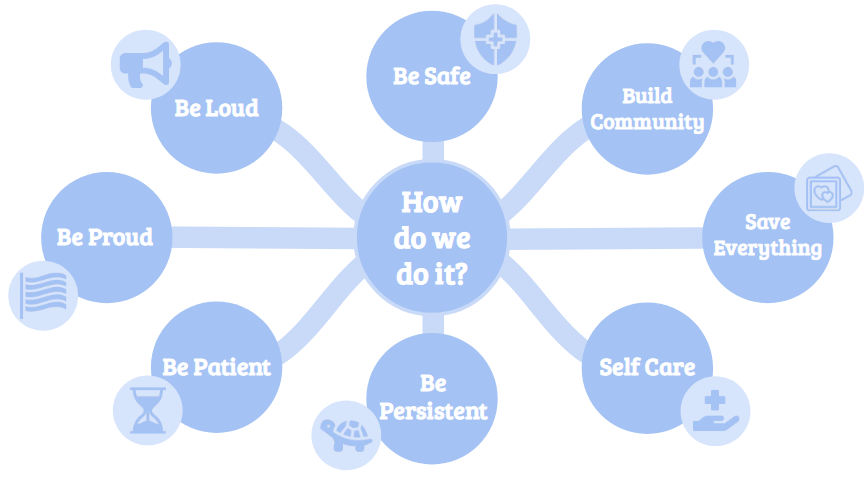
Slide 12: How to Survive This Journey
Finally, how do you get through this? How do you stay motivated when everything sucks? How do you keep going?
It's so important to be loud and be proud. It is what the LGBTQ+ community does best. We've been doing it long before Stonewall, and we will continue to fight for our existence. So hold onto that legacy and use it to carry yourself forward.
It can be exhausting being loud for so long, so remember to be patient but be persistent. Progress is often slow and painful. Slow progress is good progress. Just remember to keep moving, even if you want to be going faster.
Always remember that it's not required to come out to be proud and be a member of the LGBTQ+ community. It's important to be safe above anything else. Also, branching off of this, keep each other safe. I like to always keep in mind that everything I do, all the energy I've expended is worth it, as long as at least one person benefits and feels safer. This is a massive part of building community. I mentioned this when talking about an actively violent environment, but many times, the most radical act is building community and connections and loving each other. It's easy to wish you were doing more, but it's enough to just build a small tight community.
Then finally, some more concrete tips are to save everything and self care. The first time I mentioned "saving everything" it was in the context of making a formal report. Also remember to save the good things. Part of building my website was going through my phone and finding so many pictures from so many important events and it made me so happy to find those pictures and look back on them. So save everything that makes you happy and reminds you of how far you've come and why the work is worth it.
Then self care is another "easier said than done". Take the time to let others do the work or let others help you do the work or just take a break from the work and do something for you. I've been repainting all the furniture in my room this week and logging off my computer for hours at a time. It's been wonderful.
It's not an easy journey to do on purpose. It wasn't even easy to do accidentally. The work is worth it though. The community is amazing and I'm very thankful for it and I'm thankful that I got the chance to pass these lessons onto others who care.

This work is licensed under a
Creative Commons Attribution-NonCommercial-ShareAlike 4.0 International License
Back to Top